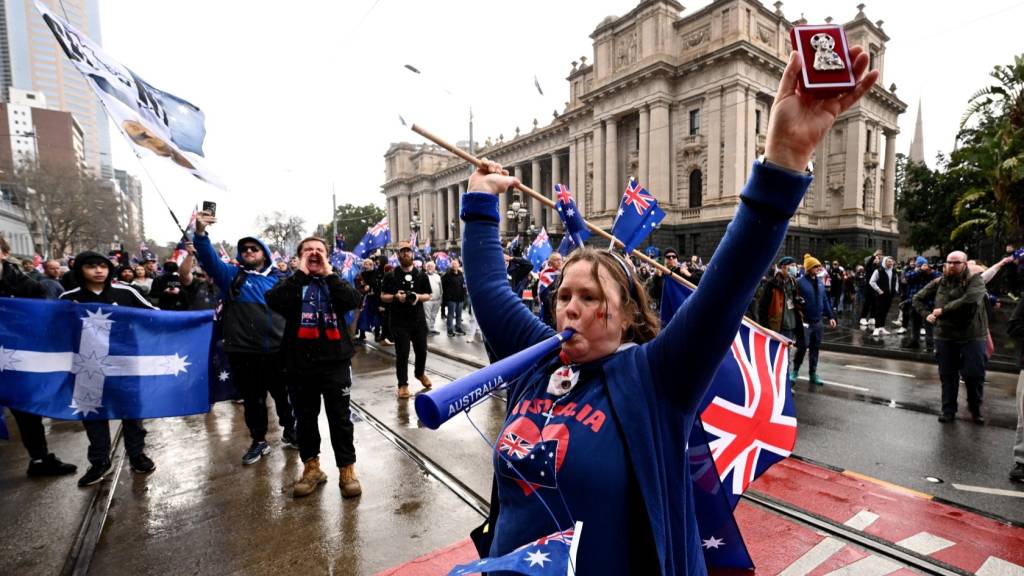High-profile far-right figures from around the world have amplified the grievances of local anti-immigration protesters on mainstream social media.
The post From Alex Jones to Elon Musk: How Australia’s anti-immigration rallies were amplified online by the gl…
Why it matters
- The involvement of prominent far-right figures has brought international attention to local anti-immigration sentiments in Australia.
- The amplification of these views on social media may embolden similar protests across other countries.
- The online discourse surrounding immigration is becoming increasingly polarized, affecting public perception and policy discussions.
In recent months, Australia has witnessed a surge in anti-immigration protests, with local demonstrators expressing their discontent over immigration policies. Notably, these grassroots movements have garnered significant attention from high-profile far-right figures globally, who have utilized mainstream social media platforms to amplify the protesters' messages. These developments have sparked a debate about the influence of international personalities on local issues and the potential consequences for social cohesion in Australia.
Among the prominent figures who have rallied behind the anti-immigration cause are controversial personalities like Alex Jones and Elon Musk. Their engagement has not only legitimized the protests in the eyes of some supporters but has also raised flags about the role of social media in shaping and spreading far-right ideologies. By sharing and endorsing the protesters’ narratives, these figures have expanded the reach of their messages, allowing them to resonate with a broader audience.
The protests, which initially began as localized events centered around specific grievances—such as rising immigration numbers and associated societal changes—have gained traction with the backing of influential personalities. This phenomenon is not unique to Australia; it reflects a growing trend where far-right rhetoric finds a platform through social media, enabling it to transcend geographical boundaries.
Social media platforms like Twitter and Facebook have played a crucial role in this amplification. Posts from high-profile individuals often garner thousands of shares and comments, creating an echo chamber where anti-immigration sentiments can flourish. The algorithms that govern these platforms tend to favor provocative content, which, in turn, can lead to increased polarization and a fragmented discourse on immigration.
The ramifications of this trend extend beyond the immediate protests. As these narratives gain traction, they can influence public opinion, sway political discussions, and potentially impact policy decisions. Local leaders may feel compelled to respond to the heightened visibility of these movements, which could lead to more stringent immigration policies or, conversely, initiatives aimed at fostering inclusivity and dialogue.
Critics of this growing far-right influence argue that it undermines the fabric of Australian society, which has long prided itself on being a multicultural nation. The fear is that the normalization of these sentiments can lead to increased xenophobia and division within communities. Furthermore, the association of local protests with global far-right figures could alienate moderate voices, making it challenging to have constructive discussions about immigration and integration.
Despite the backlash from various sectors of society, supporters of the anti-immigration movement argue that their concerns are legitimate and deserve attention. They contend that current immigration levels are unsustainable and that there is a need for more robust discussions about the implications of immigration on social services, housing, and employment.
As the situation evolves, it remains to be seen how the Australian government will respond to the growing pressures from both the protesters and the broader public discourse influenced by international figures. The intersection of local grievances and global far-right ideologies poses a complex challenge for policymakers, who must navigate the delicate balance between addressing public concerns and maintaining a commitment to inclusivity.
In summary, the recent uptick in anti-immigration protests in Australia, fueled by the endorsement of high-profile far-right figures on social media, signals a troubling shift in public discourse. The implications of this trend could have lasting effects on both the societal fabric of Australia and the broader global conversation surrounding immigration and nationalism.











